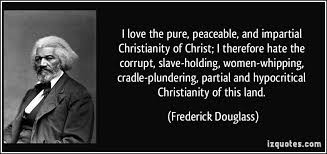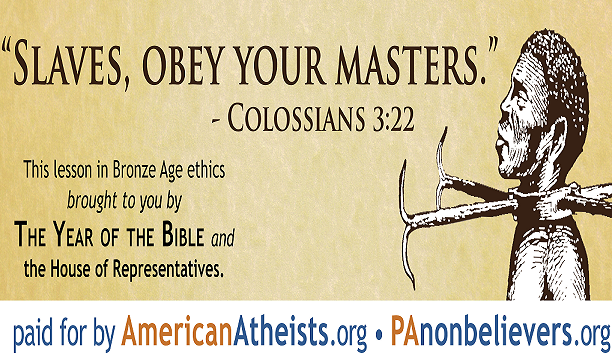
On this day many, including Google’s homepage, honor Frederick Douglass’ legacy. Born into slavery, he heroically fought for his freedom, became a leader in the abolitionist movement, and even challenged “the Great Emancipator”, President Abraham Lincoln to end his moral equivocation and openly denounce slavery as a society evil.
Upon reading his autobiography in college, I was particularly surprised by the appendix in which he qualifies his scathing critiques of American slave holders who draped themselves in piety. He embraced the “Christianity of Christ” and rejected “slaveholding Christianity” which he considered a fraud.
He wrote:
“…for, between the Christianity of this land, and the Christianity of Christ, I recognize the widest possible difference–so wide, that to receive the one as good, pure, and holy, is of necessity to reject the other as bad, corrupt, and wicked. To be the friend of the one, is of necessity to be the enemy of the other. I love the pure, peaceable, and impartial Christianity of Christ: I therefore hate the corrupt, slaveholding, women-whipping, cradle-plundering, partial and hypocritical Christianity of this land. Indeed, I can see no reason, but the most deceitful one, for calling the religion of this land Christianity. I look upon it as the climax of all misnomers, the boldest of all frauds, and the grossest of all libels.”
Douglass, himself a committed Christian saw his activism as an expression of his faith. But not all agreed with his interpretation of the faith. In 2012, an atheist organization attempted to exploit the issue in their messaging.

They posted this billboard to assert that the Bible justified American slavery. Interestingly, the billboard was quickly taken down as many African Americans (many of whom are Christians who don’t believe the Bible endorsed their ancestors’ enslavement) took offense. So who was right? Douglass? The slave owners? The American Atheists organization?
Why Accurate Bible Interpretation Matters
The Bible is the best selling book of all time, but also the most misunderstood. Often, whether intentionally or unintentionally, people misinterpret it. The Bronze Age ethics that the billboard alludes to is misrepresented in this short quote taken out of context. The quote is in the New Testament in the first century from the Apostle Paul. Most scholars agree that it was written in about 60 AD. (over 1,000 after the Bronze Age by the way).
Before we can rush in to grasp meaning, we have to know the context.
- The Apostle Paul wrote this letter while in prison by the oppressive, dictatorial Roman empire because of sharing his faith in Christ which was causing believers to be persecuted. There was no voting for 13th Amendments in this Empire. Dissenters were executed (like Jesus, Peter, and later the author Paul eventually would be). This matters because in the same way that he endured his unjust treatment with hope, he encouraged others to do the same while still fighting for a just society and freedom.
- As a Jew, the Exodus Story of God freeing the nation of Israel from slavery was the seminal narrative. Core to Jewish theology was the understanding of God as a Deliver from spiritual and physical oppression and the ethic of treating each other as created in the image of God. Elsewhere we see Paul refer to slave traders as those who would not see the Kingdom of God (1 Timothy 1:10). In his own personal letter to Philemon, he also instructs him to receive his runaway slave as brother and no longer a slave.
- Slavery in the Roman empire was significantly different than ‘chattel slavery’ of the United States. Often times, in that time is was more like an indentured servitude brought on by financial debts. For the billboard above to associate the two is a misappropriation of history.
- Most significantly, the whole Gospel ethic was opposed to mistreating people who were made in the image of God and instead embracing God’s call for us to love everyone including our enemies. It’s impossible to love anyone while you’re whipping, raping, and exploiting her. Which brings me back to Frederick Douglass.
Douglass rightly made the largest distinction possible between his “Christianity of Christ” and the “slaveholding Christianity” that many in America embraced. And he was not alone. The abolitionist movement was dominated by people who believed that it was their Christian duty to fight against the evils of slavery because of their faith. I’m grateful for Douglass’ courageous faith that prophetically called out the fraudulent piety of those oppressors, while simultaneously building a movement among those willing to sacrificially lay down their lives for the freedom of others. Isn’t that what Jesus did? He laid down his life to give freedom to those in spiritual bondage. Today, and everyday, I give thanks to Him for that sacrifice as well as those like Frederick Douglass, Sojourner Truth, Harriet Tubman, and many more who gave all so I could be free from spiritual and physical chains. Happy Black History Month!

Sometimes it truly does scare me to see how quickly people will use the stories of the bible to commit the most evilest acts known to man. I remember hearing all the stories about how some of the most disguising acts of torture happen in the Christian church. I understand now that it is the people who are sick and not the bible yet to know so many followed the teachings and believed God was on their side makes no sense to me and I glad it doesn’t because I do not want it to.
LikeLike
thanks for sharing. yes, it is disturbing and yet an affirmation of the biblical teaching of the universal sin condition befalling humanity. We will distort anything even the the truth that will set us free.
LikeLike